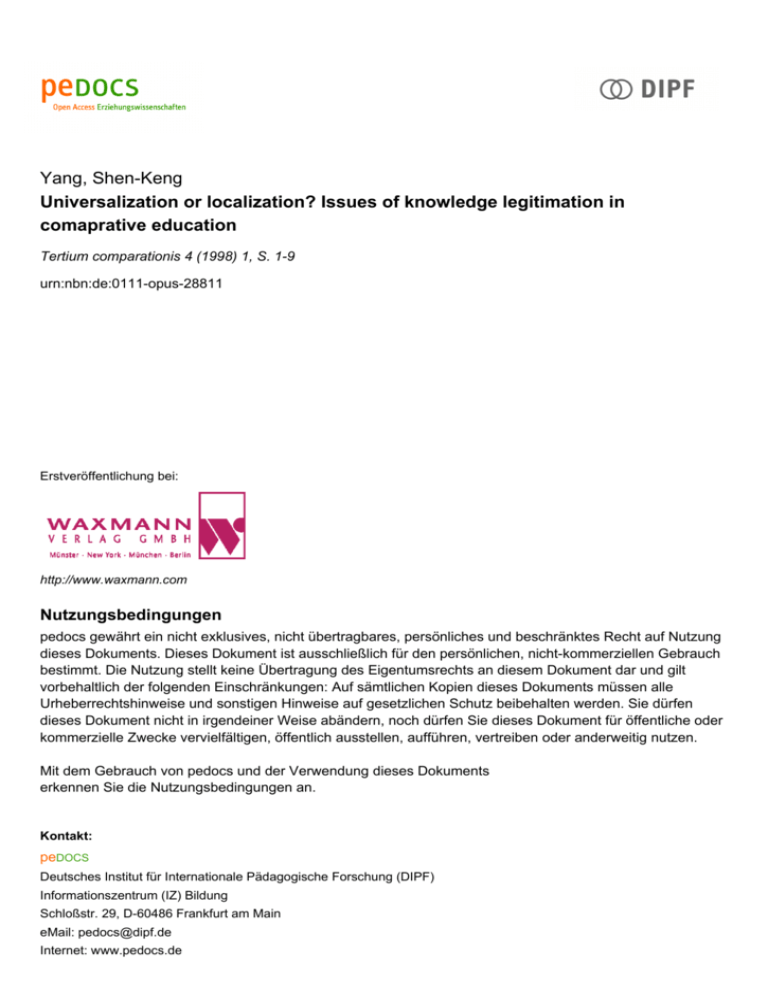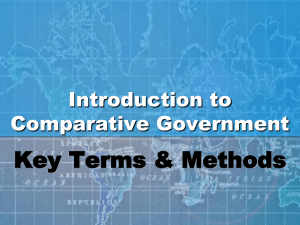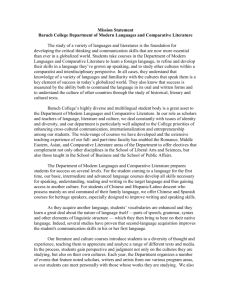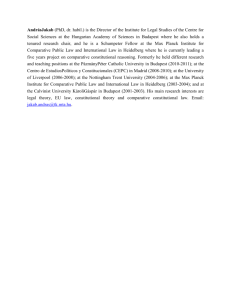
Yang, Shen-Keng
Universalization or localization? Issues of knowledge legitimation in
comaprative education
Tertium comparationis 4 (1998) 1, S. 1-9
urn:nbn:de:0111-opus-28811
Erstveröffentlichung bei:
http://www.waxmann.com
Nutzungsbedingungen
pedocs gewährt ein nicht exklusives, nicht übertragbares, persönliches und beschränktes Recht auf Nutzung
dieses Dokuments. Dieses Dokument ist ausschließlich für den persönlichen, nicht-kommerziellen Gebrauch
bestimmt. Die Nutzung stellt keine Übertragung des Eigentumsrechts an diesem Dokument dar und gilt
vorbehaltlich der folgenden Einschränkungen: Auf sämtlichen Kopien dieses Dokuments müssen alle
Urheberrechtshinweise und sonstigen Hinweise auf gesetzlichen Schutz beibehalten werden. Sie dürfen
dieses Dokument nicht in irgendeiner Weise abändern, noch dürfen Sie dieses Dokument für öffentliche oder
kommerzielle Zwecke vervielfältigen, öffentlich ausstellen, aufführen, vertreiben oder anderweitig nutzen.
Mit dem Gebrauch von pedocs und der Verwendung dieses Dokuments
erkennen Sie die Nutzungsbedingungen an.
Kontakt:
peDOCS
Deutsches Institut für Internationale Pädagogische Forschung (DIPF)
Informationszentrum (IZ) Bildung
Schloßstr. 29, D-60486 Frankfurt am Main
eMail: pedocs@dipf.de
Internet: www.pedocs.de
Tertium Comparationis
Journal für Internationale Bildungsforschung
Vol. 4, No. 1, pp. 1-9, 1998
Copyright © 1998 Waxmann Verlag GmbH
Printed in Germany. All rights reserved
Universalization or Localization?
Issues of Knowledge Legitimation
in Comparative Education
Shen-Keng Yang
National Taiwan Normal University
Abstract
The endeavor to unite the universal and the accidental in both, the physical and the social world into one
theoretical framework – the idea of such a unity can be found already in the Chinese concept of Tao –
dates back in the modern culture to the Enlightenment. Such a unified knowledge came to be understood
as a potential tool of forecasting and controlling societal progress. All through the positivistic 19th
century, comparativists followed Marc-Antoine Jullien de Paris, who thought educational comparison
should become an exact science whose outcomes could be used anywhere and transplanted to any place.
It was Michael Sadler who as the first comparative educationalist strictly refused the idea of cultural
and institutional borrowing. Under his influence comparative education focused on the variations unique
to the single countries and to the factors underlying these variations. Even the later emerging
functionalist method remained in the tradition of a „one-dimensional logic“, which, as Marcuse alleged,
was inseparably connected with the rationale of domination of nature and society. It is only the
postmodern sight, which – without giving up the humanistic ideas of modernity which originated in
Western modernization – opens possibilities to enter a cross cultural dialogue and to accept multiple
theoretical realities.
1 Introduction
In his „Der Aufbau der geschichtlichen Welt in den Geisteswissenschaften“ Dilthey (1914:
99) claims that the task of comparative methods in human sciences is the chance to
overcome limits set by one’s own range of experience and „to rise to truths of greater
universality“. By adopting comparative method and psychological foun
dation the emerging
new special sciences are, according to Dilthey (1923: 144), acquiring the character of
general theories. The criteria of generality and parsimony imply, as Przeworski and Teune
(1970: 22) argue, that „the same theories must be evalua
ted in different systemic settings
and that social science theories can gain confirmation only if theories formulated in terms
of the common factors constitute the point of departure for comparative research“. In
TC, 1998, 4(1)
1
comparative education, a theoretical framework not to be taken for granted is, as Epstein
(1992: 47) maintains, the requisite for doing genuine comparison.
The formulation of universal theoretical framework to distinct universalia from
accidentia both in physical and social world can be traced to the legacy of the En
lightenment. For the philosophers of the Enlightenment the whole world is nothing but a
mechanical mathematical structure. Thus the events of the world can be explained,
predicted and even controlled by a universal law. Cartesianmathesis universalis and
Leibnitzian characteristica universalica represent the scientific ideal in the Enlightenment.
The rise of modern social sciences began, as Hollinger (1994: 3) observes, with the
need to understand modernization following the Enlightenment ideals for trans
forming
society. Prediction and control of social development were called for the transforma
tion of
society. Universally valid knowledge for prediction was required within the context of
social modernization.
Within the larger context of social modernization resulted from the Enlightenment there
arose a need to establish rational educational science. Immanuel Kant and E. C. Trapp
were two prominent representatives of the trend towards exact and precise educational
science that, analogously to physical sciences, could offer universally valid knowledge of
education.
In the context of Enlightenment scientific ideal, Marc-Antoine Jullien de Paris,
generally considered the father of comparative education, claimed that the ultimate aim of
comparative studies of education indifferent countries was „to deduce true princi
ples and
determine rules so that education be transformation into an almost positive science“. As a
train of cultural modernization, contemporary positivism in comparative education has also
been attempting to formulate universal nomological laws to explain and predict educational
development without taking into account of the cultural peculiarities.
However, as the process of Western modernization has expanded to take in virtual
ly the
whole world in the last few decades, postmodernism became more and more important in
response to the restrictions of modernity logic. The universal law of educational
development is often criticized for its Eurocentrism, logocentrism and totalization of metanarrative, which negates the identities created within the experi
ence of multiple narratives
and „border“ crossings. Varieties of forms of knowledge, specifi
cally localized knowledge,
are emphasized in postmodern education.
Confronted with the tensions of modern homogenization and postmodern heteroge
nization, how is comparison between different educational systems in various countries
possible? What is the legitimation basis of knowledge in comparative education? This
paper turns attention to these issues from historical and international perspectives.
2 Legitimation of Comparative Knowledge in Positivism Tradition
At the very beginning of his Metaphysics Aristotle states, „All men by nature desire to
know“ (Aristotle, Metaphysics, A 980a). It seems that all the men are born to have the
natural tendency to search for knowledge. Comparison as universal mental activity of
humankind leads, as Schriewer (1988: 32) claims, to the acquisi
tion of knowledge,
specifically the knowledge of relations.
In order to establish the knowledge of relation commensurable principles are essential.
Concerning the commensurable principle for identifying similarities and differences
2
TC, 1998, 4(1)
pher Han Fei Tzu
between things, already early in the third century B. C. Chinese philoso
(ca. 280–233 B. C.) had the following discussions:
„Tao is that by which all things become what there are. It is what with which all principles
are commensurable. Principles are patterns (wen) according to which all things come into
being, and Tao is the cause of their being. Therefore it is said that Tao puts things in order
(Li). Things have their respective principles and cannot interfere with each other, therefore
principles are controlling factors in things. Everything has its own principle different from
that of others, and Tao is commensurate with all of them [as one]“ (Han Fei Tzu, chap. I:
Interpretations of Tao).
The search for a unified law (or so-called Tao inHan Fei Tzu) to be commensurate with
varieties of things was the scientific ideal in the age of Enlightenment. The comparative
method was thought out by the philosophers of Enlightenment as means to reach rigorous
scientific knowledge and to accelerate progress. As an heir of Enlightenment, MarcAntoine Jullien de Paris, evidently influenced by his contempora
ry comparative anatomist,
G. Cuvier, adopted comparative method to perfect education science: „Researches on
comparative anatomy have advanced the science of anatomy. In the same way the
researches on comparative education must furnish new means of perfecting the science of
education.“ (Marc-Antoine Jullien de Paris 1816–1817, Fraser trans. 1963: 41)
By the application of comparative method, Jullien intended education to become an
exact science based on positive and well-established principles. Once the principles of
educational development are well-established, transposition of education from one country
to another country for purpose of improvement is possible. As a matter of fact, many
educational comparativists in the nineteenth century, e.g. Victor Cousin, Horace Mann,
Matthew Arnold, had the common conviction that the transplanting and domestication of
educational system with little modification was the suitable way to improve one’s own
education, for general principles of education might be common to all nations and general
laws of education must be made applicable to different countries (Noah & Eckstein 1969:
14–33).
Michael Sadler was the first educational comparativist who firmly repudiated the idea
of direct cultural and institutional borrowing from other countries. In his famous Guildford
lecture, Sadler uttered his famous dictum that the „things outside schools matter even more
than the things inside the schools, and govern and interpret the things inside“ (cit. in Jones
1969: 50). Sadler’s major theoretical contribution to comparative education is, as Noah and
Eckstein (1969: 46) observe, „the axiom that schools of a society must be studied in of
society.“ Thus universally valid knowledge deduced from comparison was denied by
Sadler as unfounded, for „all good education and true education is an expression of
national life and character“ (ibid.)
Under the influence of Sadler, most of the comparative education works in the first half
of the twentieth century were, as Bereday (1964: 8) observes, „concerned with the social
causes behind the pedagogical scene.“ The prominent scholars in comparative education,
e.g. Kandel, Hans, Schneider, Mallison, etc. elaborated on various aspects of the Sadlerian
approach. Through comprehensive analysis of the interaction of educational and social
phenomena, they tried to seek their explanations of the forma
tion and the development of
educational system in each country. They represented, as Noah and Eckstein (1969: 56–
57) maintain, forces and factors approach with special emphasis on the explanation of the
variations in education from country to country.
TC, 1998, 4(1)
3
Among the proponents of social explanations in comparative education, Hans was the
first who was aware of the importance of functionalism in educational re
search. In his
„Functionalism in Comparative Education“ (1964), Hans demanded functional analysis
instead of statistical study in comparative education. Functionalism in compa
rative
education is meant by Hans (1964: 94) „the comparison of functions of educa
tional
institutions as they were historically evolved in each country.“ This kind of under
standing
of functionalism is, as Welch (1991: 509) argues, somewhat miscon
ceived. Hans partly
confused functionalist analysis with the historical mode of re
search: „Comparative
Education by evaluating seemingly identical functions should compare also the historical
past, which is a part of the present“ (Hans 1964: 97).
Unlike the historical approach, functionalism focuses, as Anderson (1961: 4) indicates,
„upon patterns comprising abstracted social systems, exploring relations
hips of essentially
undated and often timeless nature.“ From functionalist perspective, schools as integrative
agencies are, as Kazamias and Schwartz (1977: 163) argue, „expected to perform functions
to maintain social equilibrium: they are expected to adapt constantly to other systems.“ The
legitimation of comparative knowledge is thus based on if the result of comparative study
can be efficiently put into improving education for producing people to fit the alreadydetermined social needs. The issue of the intermingling of historical and social
construction of educational knowledge with social power relationship is almost completely
neglected.
Functionalists contented themselves with only the application of contemporary social
science concepts and research techniques to deal with the functional relationship between
society and education. Positivists in comparative education proceeded further to formulate
„laws“ to explain and predict educational trends. The culminating point of comparative
education is, according to Bereday (1964: 25), to be concer
ned with the overall impact of
education upon society in a world perspective. The final stage of this discipline is thus
concerned with the formulation of „laws“ or „typologies“ that permit an international
understanding and a definition of the complex interrelation of the schools and the people
they serve.
The development of a systemic, controlled, empirical and critical methodology is
specifically emphasized by Noah and Eckstein (1969: 122) in their„Toward a Science of
Comparative Education“ (1969). Quantification and hypothesis testing are thought to be
most important to build a rigorous Science of Comparative Education. De
scribing scientific
approach of Noah and Eckstein as methodologism, Barber (1972: 424–436) comments: „it
presumes that reliability, precision, and certitude can be attained by the dutiful application
of specific methods and techniques-irrespective of the nature of the subject under study.“
Rigorous quantitative hypothesis testing is also emphasized by Psacharopoulos (1990)
in his study of the relationship of comparative education and educational planning.
Unsatisfied with the long, non-quantitative accounts of the educational system of a single
country, Psacharopoulos (1990: 380) advocates that the goal of linking com
parative
education research with educational policy and planning can only be achieved through
„conceptualization, methodological design, statistical sampling, rigorous data analysis, and
hypothesis testing“.
Irrespective of functionalism or positivism in comparative education, they use the
natural sciences as ideal models of educational research. As Horkheimer (1972: 190) puts
it: „The sciences of man and society have attempted to follow the lead of the natural
4
TC, 1998, 4(1)
sciences with their great successes.“ Educational knowledge is thus legitimated through
rigorous scientific research design analogously to that of natural sciences. Educational
knowledge is thought to be universally valid, not bound to any specific time and social
context. Models of cause-effect are transformed to those of means-ends. Practice is narro
wed to technical know-how.
This kind of supposedly universal educational knowledge is the product of western
rationalistic logic. On the one hand it is criticized by critical theory as scientism ideology
detached from real social process. On the other hand, the legitimation of the scientific
knowledge is also strongly doubted by postmodernist for its risking the danger of falling
into totalianism and neglecting the indigenous knowledge.
3 Legitimation Crisis or Delegitimation of Knowledge
in Comparative Education
The establishment of universal nomological law in comparative education to predict and
explain the educational development is, as indicated above, rooted in the rationali
stic logic
since Enlightenment. Formal logic provides the model of thinking. Methodo
logical rigor,
empirical evidence and exact test of hypothetical causal relation are deemed to be
paramount important in acquiring universal scientific knowledge.
However, formal logic, as one-dimensional reduction logic, constitutes, according to
Marcuse (1967: 152), elements of domination structure, including substantial detach
ment
of thinking from its object, conflicts between phenomenon and essence, tensions between
„Is“ and „ought“. Formal logic together with highly abstracted and mathema
ticized
scientific thinking produce a kind of rational enterprise of science, which makes it possible
to raise the standard of human life. However, the rational scientific enterprise brings about
also a schema of thinking and behavior, which justifies the destructive potential in the
scientific enterprise itself. Scientific rationality combined with domi
nation makes it
impossible to fully develop humanity.
Following Marcuse’s critique of modern scientific and technological rationality,
Habermas (1969) reconstructs Weber’s concept of rationalization to explicate the double
functions of science and technology: production and ideology. According to Habermas
(ibid: 64), Weber’s concept of rationalization in the evolution of modern society has two
significant meanings: on the one hand it signifies the wide extension of the scope of
appealing to the criteria of rational decision in social life. On the other hand the continuous
industrialization of social labor makes the criteria of instrumental action penetrate into
every sphere of social life. Consequently instrumental action overcomes social practice
based on communicative action.
Moreover, from perspective of social evolution Habermas argues that the legitima
tion
of political domination in civilized traditional society through mythology, religion and
metaphysics has been lost in highly rationalized modern society. Instrumental action based
on accountability determines, instead, the legitimation. The criteria of achievement in the
society offer the legitimate status of purposeful-rational action. The ideology of fair
interchange corresponds exactly with this type of action. Since domination facilitates the
formation of the conditions for just exchanges, it is thus legitimated. In post-capitalistic
society, this relationship of domination begins to fall into crisis. State can no longer assure
the fairness of exchanges. Therefore, the state seeks to maintain its authority of control by
TC, 1998, 4(1)
5
direct interference into the exchange relations. In the process of interference, the state can
no longer use traditional myths and world-views to legitimate its governance. It must
constantly search for new sources of legitimation. The most important sources of
legitimation in post-capitalistic society are science and technology. The logic of scientific
and technological progress determines the development of social institution and economic
growth. Thus the state often adopts science and technology as means of legitimating its
decision-making process.
From comparative education perspective, Weiler (1983) explored the role of knowledge
based on scientific research in the legitimation of educational decision-making. For Weiler
(1983: 269), the notion of „reforms as experiments“ is the ap
plication of the classical
paradigm of scientific methodology to the realities of public policy. It raises the prospect of
being able to judge, „with scientific conviction and credibility, that one social program was
‘better’ than another, that advocates of a given policy were ‘right’ and its opponents
‘wrong’“. Weiler refers to the introduction of comprehensive schooling models in Sweden,
and, later, into the Federal Republic of Germany as exemplifying the form of using
scientific experimentation as a means of compensatory legitimation.
The extension of science and technology and associated purposive-rational systems of
actions have, according to Habermas (1969), yielded a net increase in forms of social
control. Science and technology become background ideology (Hintergrundideo
logie)
which penetrates tacitly into the consciousness of populace. Science and techno
logy
develop as another kind of mythos and become the tool of legitimating public policy in a
„black box“ process. Authentic personal autonomy and social solidarity can not be
reached. The truly rational process of decision-making should be carried out through
domination-free communication. Thus the consensus reached by practical and theoretical
discourses in an ideal speech situation becomes the legitimation basis of public decisionmaking and valid knowledge.
The principle of consensus elaborated by Habermas as a criterion of validation is
criticized by Lyotard (1984: 60) as inadequate, for this conception is based on validity of
the narrative of emancipation. As one of grand narratives of modernity, the narra
tive of
emancipation has lost its credibility. The practice of modern sciences is justi
fied, as
Lyotard (1984: 31–32) argues, by two philosophical principles: the attainment of universal
knowledge and the attainment of universal freedom. Science as form of knowledge has
been thought to be superior on account of its avowed ability to meet the needs of these
principles, that is, freedom from ignorance and prejudice. However, these metanarratives
have lost their credibility. Science in postmodern society plays only its own game, „it is
incapable of legitimating the other language games“ (Lyo
tard 1984: 40).
Parallel to the delegitimation tendency of scientific knowledge, the decline of the status
of the intellectuals represents another prominent feature of postmodernism. Traditionally,
intellectuals possessed the privileged status of providing authoritative solutions to
questions of cognitive truth, moral judgment and aesthetic taste (Bauman 1987: 219). The
essential idea of the pluralistic stance of postmodernism is, as Harvey (1990: 48) puts it,
„that all groups have right to speak for themselves, in their own voice and have that voice
accepted as authentic and legitimate.“ The intellectuals have lost their prerogative to
legitimate the authority of knowledge.
In conjunction with the pluralistic stance of postmodernism and incredulity towards the
totalizing metanarratives, the superiority of western culture on a global scale and the
6
TC, 1998, 4(1)
dominance of main-stream refined culture have been abandoned. Inappropriate theories,
models and concepts derived from solely western experiences have been confronted with
severe challenges. The boundaries between „majority“ and „minority“, and between
„refined“ and „popular“ culture have broken. Postmodernism provides, as Rust (1991: 619)
remarks, a sense of hope and legitimacy for those Others. The voice of the Others should
be listened to carefully with understanding and apprecia
tion.
In correspondence to postmodern incredulity towards metanarrative, pluralistic stance
and „border-crossing“ cultural orientation, a universally valid knowledge in comparative
education can not legitimate itself. As Masemann (1990a: 471) observes, „in the postindustrial era knowledge paradigms will change: new form of research in comparative
education will blossom in new and theoretically fruitful directions.“
The new forms of research will be holistic, context dependent and integrative. Old
forms of ways of knowing should be adapted to deal with the need for personalized,
contexted knowledge. Moreover, indigenous knowledge forms in the areas of world that
are not „successfully“ industrialized are once again seen as valid forms of knowledge.
Education reform project based on western-oriented rationalistic logic should not,
according to Masemann (1990b: 1848–1857), be imposed on the non-western world.
lndigenous form of knowledge should be taken into serious accounts in im
plementing
education reform.
For postmodernists, the claim that one way of knowledge is the only legitimate way,
would, as Rust (1991: 616) argues, be rejected. The postmodernist’s task would, according
to Rust, be „to determine which approach to knowing is appropriate to specific interests
and needs rather than argue some universal application and validity, which and ends up
totalizing and confining in its ultimate effect.“ The universally valid knowledge is
delegitimated by postmodern perspective. The validity of knowl
edge should be localized to
meet the need of what Derrida (1978) conceptualized asdifference.
4 Outlook
In order to avoid the simple data collection and description of foreign education, the
establishment of tertium comparationis is, according to Röhrs (1995: 15), essential for the
explanation in the framework of comparative educational science. The tertium
comparationis is the third, through which the comparison of two educational fields in
international room is possible. For Bereday (1964: 9–10), thetertium comparationis is the
criterion upon which a valid comparison can be made and the hypothesis for which it is to
be made.
Problems arise as postmodernists take stance of incredulity towards univers
al knowledge validity: How can a tertium comparationis be built? Should the education comparativist
be „trapped“ into localized frameworks that disallow compari
son?
Concerning the attitude towards modern homogenous universality and postmodern
locality, one should bear in mind, as Heraclitus (Diels & Kranz 1956: 22, Herac. B51)
says, „That which is contrary is actually in agreement to itself.“ Postmo
dernism is never
antimodernism. Rather it radicalizes modernism with the common objective of
emancipating humanity from inner and exterior domination and thus leading to the
realization of authentic self. Thus the modern claim of universal validity does not exclude
the respect for peculiarity. The modern universalizing tendencies associated with Western
TC, 1998, 4(1)
7
culture should be subjected to reinterpretation and transformation in order to include the
understanding, appreciation and even assimilation of the peculiari
ties of the Others in the
globalizing process.
Similarly comparative education in the 1990ies is charac
terized by Paulston (1992) as
arriving at a period of theoretical pluralism and heterogeneity. According to Paul
ston,
comparative education and social sciences in the 1990ies consists of disputatious yet
complementary knowledge that has come to recognize, tolerate and even appreciate the
existence of multiple theoretical realities and perspectives. Incommensurable as they are,
they open to each other the new insights and ways of seeing the world. Only with such a
broadened vision, the Utopian aim, as depicted in Delors’ Report (Delors et al. 1996: 51),
of steering the world towards greater mutual understanding, a great sense of responsibility
and solidarity, through acceptance of our spiritual and cultural differences, can be
actualized.
Note
1.
Paper prepared for presentation at 10th World Congress of World Council of Comparative
Education Societies (WCCES): Cape Town, South Africa, 12-17 July, 1998.
Bibliography
Anderson, C.A. (1961). Methodology of Comparative Education. International Review of Education, 7 ,
1–23.
Barber, B.R. (1972). Science, Salience and Comparative Education: Some Reflections on Social
Scientific Inquiry. Comparative Education Review, 16 (3), 424–436.
Bauman, Z. (1987) Legislator and Interpreters on Modernity, Postmodernity, and Intellectual .
London: Cambridge University Press.
Bereday, G.Z.F. (1964). Comparative Method in Education . New York: Holt, Rinehart and Winston.
Delors, J. et al. (1996). Learning: The Treasure Within. Report to UNESCO of the International Com mission on Education for the 21st Century . Paris: UNESCO.
Derrida, J. (1978). Writing and Difference (translated by A. Bass). London: Routledge.
Diels, H. & Kranz, W. (Hrsg.). (1956). Die Fragmente der Vorsokratiker (8. Aufl.). Berlin: Weidmann.
Dilthey, W. (1914). Der Aufbau der geschichtlichen Welt in den Geisteswissen schaften, vol. 7. Leipzig
& Berlin: Teubner.
Dilthey, W. (1923). Einleitung in die Geisteswissenschaften (Wilhelm Diltheys Gesammelte Schriften,
Bd. 1). Leipzig & Berlin: Teubner.
Epstein, E. (1992). Uses and Misuses of Comparative Research: How We Can Strengthen Our Field as
We Move Toward the 21st Century. In José Luis García Garrido et. al. (Eds.), Reformas E Inno vaciones Educativas En El Umbral Del Siglo XXI: Una Perspectiva Comparada . Madrid: UNED.
Fraser, S. (1963). Jullien’s Plan for Comparative Education 1816–1817 Teachers College . Columbia
University.
Habermas, J. (1969). Technik und Wissenschaft als Ideologie. In J. Habermas, Technik und Wissen schaft als Ideologie . Frankfurt a.M.: Suhrkamp.
Hans, N. (1964). Functionalism in Comparative Education. International Review of Education, 10 (1),
94–105.
Harvey, D. (1990). The Condition of Postmodernity . Oxford: Blackwell.
Hollinger, R. (1994). Postmodernism and the Social Sciences . Thousand Oaks: SAGE.
Horkheimer, M. (1972). Critical Theory . New York: Continuum.
8
TC, 1998, 4(1)
Jones, Ph.E. (1969). Comparative Education: Purpose and Method . St. Lucia: University of Queensland Press.
Kazamias, A.M. & Schwartz, K. (1977). Intellectual and Ideological Perspectives in Comparative
Education: An Interpretation. Comparative Education Review, 21 (2–3), 153–176.
Lyotard, J.-F. (1984). The Postmodern Condition: A Report on Knowledge, transl. by Geoff Benning ton and Brian Massumi . Minnesota: University of Minnesota Press.
Marcuse, H. (1967). Der eindimensionale Mensch . Neuwied: Luchterhand.
Masemann, V. (1990a). Ways of Knowing: Implication for Comparative Education. Comparative
Education Review, 34 (4), 465–473.
Masemann, V. (1990b). Educational Reform: Impact of Indigenous Forms of Knowledge. In Torsten
Husén & T. Neville Postlethwaite (Eds.), International Encyclo pedia of Education , vol. 4, 2nd ed.,
(pp. 1848–1857). Oxford: Pergamon.
Noah, H.J. & Eckstein, M.A. (1969). Toward a Science of Comparative Education . London: CollierMacmillan.
Paulston, R.G. (1992). Comparative Education as an Intellectual Field. Mapping the Theoretical
Landscape. Paper presented at the 8th World Congress of Comparative Education, July 8–14,
Prague, Czechoslovakia. [An abbreviated version was subsequently published in Compare, 23 (2),
101–114].
Przeworski, A. & Teune, H. (1970). The Logic of Comparative Social Inquiry . Malabar Florida:
Robert E. Krieger publishing Company.
Psacharopoulos, G. (1990). Comparative Education: From Theory to Practice, or Are You A:\Neo.* or
B:\*.ist? Comparative Education Review, 34 (3), 369–380.
Röhrs, H. (1995). Die Vergleichende und Internationale Erziehungswissenschaft . Weinheim: Deutscher Studien Verlag.
Rust, V. (1991). Postmodernism and its comparative education implications. Comparative Education
Review, 35 (4), 610–626.
Schriewer, J. (1988). The method of comparison and the need for externalization – Methodological
criteria and sociological concepts. In J. Schriewer & B. Holmes (Eds.), Theories and Methods in
Comparative Education . Frankfurt: Lang.
Weiler, H.N. (1983). Legalization, Expertise, and Participation: Strategies of Compensatory Legitimation in Educational Policy. Comparative Education Review, 27 (2), 259–277.
Welch, A.R. (1991). Knowledge and Legitimation in Comparative Education. Comparative Education
Review, 35 (3), 508–531.
TC, 1998, 4(1)
9








